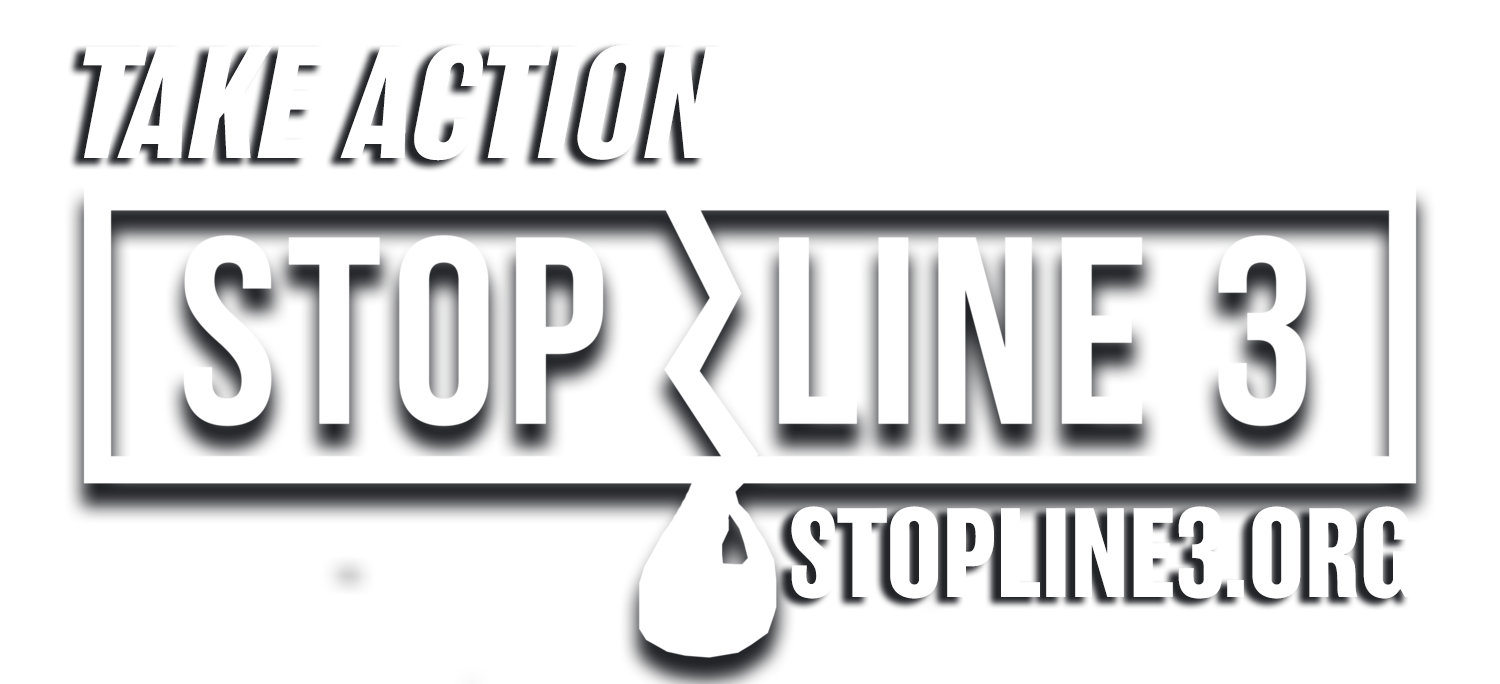Published 1:30pm CST, Thursday, 6/28/18
Updated 6:00pm CST, Thursday 6/28/18 to include additional PUC decisions made in the afternoon.
Updated 9:00am CST, Friday 6/29/18 to include additional detail about the next steps in the permitting process.
Today, the Minnesota Public Utilities Commission approved the new Line 3 pipeline, in Enbridge's preferred new route. They opened up a brand new energy corridor through the lakes and wild rice beds of the North, the heart of Ojibwe treaty territories, and the ancestral homelands of the Oceti Sakowin.
At 7:00 this morning, a water protector ascended a 25-foot steel tripod structure and blockaded traffic for several hours in front of the PUC office in downtown St. Paul, to demonstrate ongoing resistance to Line 3. Read the action's full press release here and watch Unicorn Riot's live video coverage here.
The PUC began their fifth day of meetings on the Line 3 permits as scheduled at 11:00am, shortly after the water protector was taken down from the pod, and each commissioner in turn voiced the same conclusion - that despite the opposition of all 5 impacted tribal governments and the general public, and despite the Dayton's administration's conclusion to the contrary, Minnesota needs a new oil pipeline. They ruled, based on all the evidence, that a new Line 3 is "in the best interest of society."
Photo: Tania Aubid, Ogichidaakwe from East Lake and member of the Mille Lacs Band of Ojibwe, reacts to the PUC's decision to approve the Line 3 Certificate of Need, "You have just declared war on the Ojibwe!" (credit: PowerShift Network)
Opponents to the project felt a whirlwind of emotions after hearing the decision. Tania Aubid, Ogichidaakwe from East Lake, stood up and told the commissioners “You have just declared war on the Ojibwe!,” and Akilah Sanders-Reed of the Youth Climate Intervenors screamed “Shame on you, you cowards!” Brent Murcia of the Youth Climate Intervenors told the commissioners, “This is our future and we will not let this stand.” And Honor the Earth’s Executive Director, Winona LaDuke, posted immediately on facebook that Minnesota now has its Standing Rock:
Photo: Winona LaDuke addresses an emotional crowd outside the PUC offices shortly after their approval of the Line 3 Certificate of Need. (Credit: Pickett Pictures LLC)
After lunch, the PUC voted 5-0 to approve the Certificate of Need. They then moved to the question of route, and narrowed down their choices to the APR (Applicant's Preferred Route) and Route Alternative 3. All 5 Ojibwe bands intervening in the case reiterated their preference for Route Alternative 3 because it would have far less impact on the environment and on tribal territories and resources. The PUC ignored this and voted 3-2 to select the Applicant's Preferred Route. This is despite the Administrative Law Judge's conclusion that the APR was too destructive to justify the project, and despite formal testimony from Minnesota's environmental agencies, the Department of Natural Resources and the Pollution Control Agency, that the APR was by far the worst option.
The PUC then asked the Fond du Lac Band to choose between two different route segment alternatives, RSA 21 and RSA 22. RSA 21 would cut a new corridor just south of the FDL reservation. RSA 22 would reconnect the APR back to the existing Mainline Corridor, which crosses the FDL reservation. In other words, would you like a new pipeline on your reservation, or a new corridor just outside the reservation boundary but still well within your watersheds and the 1854 ceded territory, where you retain strong treaty rights? Fond du Lac responded that there is no real difference between their reservation and the 1854 ceded territory, from the band's perspective of a responsibility to protect. In the end, the PUC's final ruling gave Enbridge and FDL 60 days to negotiate and decide between these 2 options.
Just before 6:00pm, the PUC voted 5-0 to approve and issue a Route Permit, which outlines the terms of construction, and added several major conditions - for example, to require Enbridge to pay for additional law enforcement costs due to social unrest, and to require Enbridge to outline a plan to attempt the prevention of sexual trafficking.
Governor Dayton issued a statement about the PUC approval soon after the meeting adjourned.
What's Next? Because the PUC accepted several of Enbridge's last-minute treats to sweeten the deal (the "landowner choice program" to remove old Line 3, the financial guarantee from their parent company, etc), they can't issue a written order granting the Certificate of Need yet. First Enbridge has to submit more information about those shiny new parts of the deal (by July 16), and then other parties will have a chance to comment (by July 30). Sometime in August, the PUC will finally issue their written order, formalizing the permit approvals. Then, intervening parties will almost certainly file "Petition for Reconsiderations" asking the PUC to change their mind, and the PUC will almost certainly reject those. That process is likely to be completed in October. At that point, the opposition's only recourse is in lawsuits in the Court of Appeals. Such lawsuits could contest the approval of the EIS or the approval of the permits themselves, but no one has announced any plans for litigation so far.
The project still needs federal permits from the US Army Corps of Engineers, and they are required to hold a public input process before issuing them. We expect that process to kick off soon, now that Minnesota has approved it.




